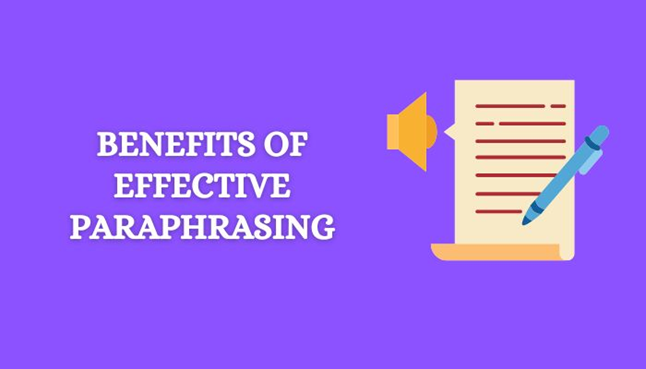Table of Contents
The Ultimate Guide to Paraphrasing and Effective Writing:
Writing effectively is a skill that requires not only a strong command of language but also the ability to convey information in a concise and engaging manner. One important aspect of effective writing is paraphrasing – the process of restating someone else’s ideas or information in your own words.
Paraphrasing not only demonstrates your understanding of the material but also helps avoid plagiarism by giving proper credit to the original source.
“The Ultimate Guide to Paraphrasing and Effective Writing” aims to equip you with the knowledge and techniques necessary to master the art of paraphrasing and enhance your overall writing skills.
Whether you are a student working on an academic paper, a professional creating business reports, or simply someone who wants to improve their writing, this guide will provide you with invaluable insights and practical strategies.
Understanding Paraphrasing:
Paraphrasing is the process of expressing someone else’s ideas or information in your own words while maintaining the original meaning. It involves rephrasing the content of a source, such as a text, article, or speech, without changing the core message.
Paraphrasing allows you to incorporate information from other sources into your writing, providing evidence, support, or clarification for your own arguments or ideas. The purpose of paraphrasing extends beyond simply replacing words with synonyms.
It involves comprehending the source material, interpreting it in your own understanding, and then expressing it using your unique voice and writing style. When done effectively, paraphrasing demonstrates your grasp of the subject matter, your ability to synthesize information, and your commitment to academic or professional integrity.
Importance of maintaining the original meaning of Paraphrasing:
(1) Preserving accuracy: The purpose of paraphrasing is to convey information from the source text in a different form while retaining its essence. By maintaining the original meaning, you ensure that the paraphrased version remains faithful to the intended message of the original author.
(2) Avoiding plagiarism: When paraphrasing, it is important to present the ideas of others in your own words. If the original meaning is not preserved, there is a risk of unintentional plagiarism, where the paraphrased content may still closely resemble the original text. By staying true to the original meaning, you demonstrate academic integrity and avoid potential plagiarism issues.
(3) Enhancing comprehension: The goal of paraphrasing is to communicate information effectively. By accurately preserving the original meaning, you enable readers to understand the content in a different presentation. Maintaining clarity and coherence in the paraphrased text helps readers grasp the ideas and concepts being conveyed.
In order to avoid Plagiarism, Paraphrasing is Essential:
Yes, paraphrasing is an important skill when it comes to avoiding plagiarism. Plagiarism is the act of presenting someone else’s ideas, words, or work as your own without proper attribution. Paraphrasing involves expressing someone else’s ideas or information in your own words while maintaining the original meaning.

When you paraphrase, you are not just changing a few words or rearranging the sentence structure. Instead, you need to understand the original content and restate it in a way that reflects your own understanding and style of writing. Paraphrasing allows you to incorporate information from other sources into your work while giving credit to the original author.
Paraphrasing can be helpful in various situations, such as when you want to include information from a source in a research paper, essay, or presentation.
Important Aspects of Effective Writing in Paraphrase Online:
One important aspect of effective writing when paraphrase online is maintaining the original meaning and intent of the source text while using different words and sentence structures. Here are some key considerations to keep in mind:

(1) Understand the source material: Before attempting to paraphrase, make sure you have a thorough understanding of the original text. Read it multiple times, highlight key points, and ensure you comprehend the main ideas and supporting details.
(2) Use your own words: Paraphrase online involves expressing the ideas of the source material in your own words. Avoid simply replacing a few words with synonyms or rearranging the sentence structure. Instead, try to fully rephrase the content while retaining its meaning.
(3) Maintain clarity and coherence: Ensure that your paraphrased version is clear and coherent, allowing the reader to understand the information easily. Use appropriate transitions and logical connections between ideas to maintain the flow of the text.
Utilizing Paraphrasing Tool Effectively:
Using a paraphrasetool.online effectively can help you generate rewritten content efficiently. Here are some tips to make the most of a paraphrasing tool:
(1) Understand the tool’s limitations: Paraphrasing tools have their limitations and may not always produce perfect results. They can struggle with complex sentence structures, idiomatic expressions, or context-specific meanings. Familiarize yourself with the tool’s strengths and weaknesses to enhance your editing process.
(2) Use a reputable paraphrasing tool: There are numerous paraphrasing tools available online, so it’s important to choose a reliable and accurate one. Look for tools that have positive reviews and a good reputation for producing high-quality paraphrased content.
(3) Start with a well-written source: The quality of your paraphrased output largely depends on the quality of the source material. Ensure that your input text is well-written, grammatically correct, and concise. A paraphrasing tool will work better when it has clear and coherent source content to work with.
Benefits of Effective Paraphrasing:
Effective paraphrasing offers several benefits for writers. Here are some key advantages:

(1) Avoiding Plagiarism: Paraphrasing helps writers avoid plagiarism, which is the act of using someone else’s ideas or words without proper attribution. By paraphrasing, writers can express information in their own words while still acknowledging the original source.
(2) Enhancing Originality: Paraphrasing allows writers to present information in a fresh and original way. It enables them to convey ideas using their unique writing style and voice, rather than simply reproducing the original text.
(3) Demonstrating Understanding: When writers paraphrase effectively, it shows their comprehension of the source material. By rephrasing and reorganizing the content, they demonstrate that they have grasped the main ideas and can communicate them in their own words.
Paraphrasing in Different Writing Contexts:
(1) Academic Writing:
- Importance of paraphrasing in academic papers.
- Paraphrasing to demonstrate understanding and critical thinking.
- Using paraphrasing to integrate sources and support arguments.
- Guidelines for paraphrasing in academic writing.
(2) Research Papers and Citations:
- Paraphrasing to summarize research findings.
- Incorporating paraphrased information into literature reviews.
- Properly citing paraphrased sources using citation styles (e.g., APA, MLA).
- Avoiding plagiarism in research papers through effective paraphrasing.
(3) Business and Professional Writing:
- Paraphrasing conveys complex information in a clear and concise manner.
- Adapting technical or industry-specific language for different audiences.
- Paraphrasing to avoid legal or ethical issues in business communications.
- Using paraphrasing to improve clarity and professionalism in business documents (e.g., reports, emails, proposals).
(4) Creative Writing and Storytelling:
- Paraphrasing adds variety and creativity to descriptions and dialogue.
- Using paraphrasing to avoid clichés and stale language.
- Adapting and paraphrasing existing stories or ideas for originality.
- Balancing paraphrasing with original expression in creative writing.
Ethical Considerations in Paraphrasing:
When engaging in the practice of paraphrasing, it is essential to uphold ethical standards to maintain academic integrity and respect the intellectual property of others. Several key considerations must be taken into account.
First and foremost, properly citing sources and giving credit to the original author is of utmost importance. Failing to acknowledge the original source of information can lead to plagiarism, which is a serious ethical violation. In-text citations and bibliographic references should be used to attribute ideas and ensure transparency.
Understanding fair use and copyright laws is another critical aspect of ethical paraphrasing. Familiarizing oneself with the concept of fair use and its limitations is necessary to determine whether paraphrasing is permissible under specific circumstances.
It is crucial to differentiate between content in the public domain, copyrighted material, and licensed content. In cases where permission is required, such as when paraphrasing from copyrighted works, seeking appropriate authorization or guidance is essential.
Maintaining Proper Sentence Structure:
One important aspect of effective paraphrasing is ensuring that the sentence structure of the paraphrased text aligns with the conventions of proper writing. Proper sentence structure not only enhances the clarity and coherence of the paraphrased content but also helps to avoid any potential issues of plagiarism or misinterpretation.
Here are some key considerations for maintaining proper sentence structure while paraphrasing:
Understand the original sentence structure: Carefully analyze the structure of the original sentence to grasp its intended meaning and organization. Identify the subject, verb, and object, as well as any dependent clauses or phrases that contribute to the overall structure.
Rephrase the sentence using your own words: Once you have understood the original sentence structure, rewrite the sentence using your own vocabulary and phrasing. Make sure to express the same idea or concept without directly copying the original sentence.
Final Words:
In conclusion, mastering the art of paraphrasing is an essential skill for effective writing. The ultimate guide provided an overview of paraphrasing techniques, strategies for different text types, and tips for avoiding plagiarism.
By practicing and honing your paraphrasing skills, you can enhance your writing by ensuring originality, demonstrating understanding, and improving clarity. Remember, effective paraphrasing not only strengthens your work but also maintains the integrity of the original sources.
With this guide as your companion, you have the tools to become a proficient paraphraser and elevate your writing to new heights.









Comments (No)